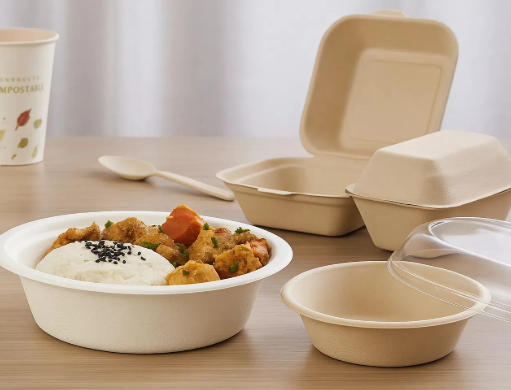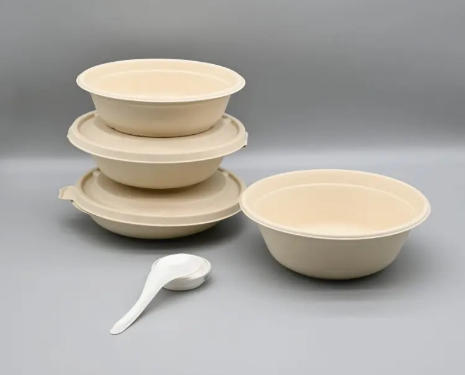
Content Menu
● Why Germany Leads in Biodegradable Bowl Manufacturing
>> Regulatory Environment and Market Dynamics
>> Technology and Production Expertise
● Core Materials Used by German Biodegradable Bowl Manufacturers And Suppliers
>> Sugarcane Bagasse
>> Bamboo, Wood Pulp, and Cornstarch
>> Palm Leaf and Edible Fibers
● Manufacturing Process: How Biodegradable Bowls Are Made in Germany
>> 1. Sourcing and Preparing Raw Materials
>> 2. Pulping and Homogenization
>> 3. Molding and Shaping
>> 4. Drying, Surface Treatment, and Quality Control
>> 5. Packaging and Distribution
● Key Players: Top Biodegradable Bowl Manufacturers And Suppliers in Germany
>> PAPSTAR GmbH
>> Wisefood GmbH
>> Bionatic GmbH & Co. KG
>> Leaf Republic GmbH
>> Honest Pack
● Broader European Suppliers Serving the German Market
● OEM and Private Label Production Capabilities
>> Customization Options
>> Certification and Compliance
● Industrial Applications and Export Logistics
>> Serving International Brands, Wholesalers, and Foodservice Providers
>> Export Experience
● Sustainability Impact and Circular Economy Practices
>> Closing the Loop for Tableware
>> Zero-Waste Innovations
● Industrial Manufacturing Processes: Technical Insight
● Future Trends for Biodegradable Bowl Manufacturers And Suppliers in Germany
● Conclusion
● Frequently Asked Questions (FAQ)
>> 1. What certifications ensure quality and safety for German biodegradable bowls?
>> 2. Can manufacturers in Germany execute OEM and customized orders?
>> 3. What raw materials are most commonly used for environmentally friendly bowls in Germany?
>> 4. How long does it take for biodegradable bowls from Germany to decompose?
>> 5. Are German biodegradable bowls suitable for hot, cold, and oily foods?
● Citations:
The demand for sustainable food packaging solutions continues to rise, positioning Germany as a leading hub for eco-conscious innovation in disposable tableware. As brands and wholesalers worldwide seek greener alternatives, the country's manufacturers of biodegradable bowls stand out for their advanced technology, robust certifications, and commitment to environmental stewardship. In this article, we provide a comprehensive guide to the top biodegradable bowl manufacturers and suppliers in Germany, explain industry standards and processes, and offer insights on sourcing for OEM needs.

Why Germany Leads in Biodegradable Bowl Manufacturing
Regulatory Environment and Market Dynamics
Germany holds a central position in Europe's eco-friendly tableware market. Stringent governmental policies such as EU Single-Use Plastics Directive and Germany's Packaging Act have accelerated the transition away from conventional disposables. Biodegradable bowl manufacturers and suppliers here not only comply with these regulations but often set new benchmarks in sustainability and operational transparency.
Technology and Production Expertise
German manufacturers have consistently invested in advanced machinery and process automation. These capabilities allow them to deliver large-scale orders while maintaining strict quality standards—essential for brands and wholesalers seeking reliable OEM partners.
Core Materials Used by German Biodegradable Bowl Manufacturers And Suppliers
Sugarcane Bagasse
The most prevalent material for biodegradable bowls is sugarcane bagasse, a byproduct of juice extraction. Bagasse provides excellent strength, is microwave-safe, and naturally decomposes within months under composting conditions. Utilizing this agricultural waste helps reduce overall carbon emissions and offers performance similar to plastic but without environmental drawbacks.
Bamboo, Wood Pulp, and Cornstarch
Bamboo fiber and wood pulp are increasingly favored for their fast renewability and natural antimicrobial properties. Bowls made from these fibers are sturdy, food-safe, and free of harmful additives. Cornstarch PLA-based bowls serve as compostable alternatives suitable for both cold and hot food applications.
Palm Leaf and Edible Fibers
Innovation in the sector includes palm leaf bowls and edible fibers that decompose quickly and appeal to zero-waste pioneers. These materials represent next-generation options for buyers prioritizing total environmental responsibility.
Manufacturing Process: How Biodegradable Bowls Are Made in Germany
1. Sourcing and Preparing Raw Materials
The process begins with sourcing bagasse or other plant-based fibers. Sugarcane stalks are crushed for juice, and the fibrous residue (bagasse) is collected from sugar mills. To ensure product safety and consistency, the bagasse is meticulously cleaned, removing dirt and sticky sugar residues.
2. Pulping and Homogenization
The cleaned fibers undergo pulping, where they are mixed with water to create a slurry. German manufacturers minimize chemical additives, favoring natural treatments, to keep fibers safe for food contact and enhance biodegradability. The result is a uniform, moldable pulp.
3. Molding and Shaping
This pulp is fed into precision molds corresponding to the intended bowl design. The molds close and apply heat and pressure, forming the fibers into a rigid, robust shape. High-quality molds enable intricate customization, including client-specific shapes and branding.
4. Drying, Surface Treatment, and Quality Control
After molding, the bowls are dried—either by gentle heat or ambient conditions—to remove residual moisture. For some products, manufacturers apply a thin, food-safe oil- and water-repellent coating, ensuring bowls can handle liquids and oil-rich foods effectively. Rigorous quality inspections follow: minor edge trimming, surface finishing, and mechanical testing ensure only the best products reach packaging.
5. Packaging and Distribution
Biodegradable bowls are stacked, counted, and packaged in recycled or compostable materials, aligning with eco-friendly principles. Many German manufacturers offer tailored packaging to support OEM or private label requirements and maintain product integrity during international shipping.

Key Players: Top Biodegradable Bowl Manufacturers And Suppliers in Germany
PAPSTAR GmbH
With roots back to the 19th century, PAPSTAR remains a cornerstone of sustainable disposable tableware. Their selection includes microwave-safe, oil-resistant biodegradable bowls made from bagasse and bamboo fiber, all certified under the strictest EU standards. Their “Pure” product line is highly sought after by international buyers for foodservice, catering, and retail.
Wisefood GmbH
Wisefood is an innovation-driven company known for not only bagasse and palm leaf bowls but also edible tableware. They have eliminated millions of single-use plastics and continue to develop home-compostable, climate-neutral solutions. Wisefood's bowls appeal to eco-brands targeting rapid market expansion in both the EU and overseas.
Bionatic GmbH & Co. KG
Bionatic, situated in Bremen, delivers everything from molded bagasse bowls to earth-friendly clamshells and cutlery. Their logistics capability supports pan-European wholesalers, e-commerce food retailers, and major event caterers. Their bowls meet the highest food safety, compostability, and traceability requirements.
Leaf Republic GmbH
Few companies match Leaf Republic's unique approach—they manufacture bowls entirely from pressed leaves without glues or chemicals. The minimalist, natural look appeals to zero-waste advocates and sustainability-focused hospitality brands. Their biodegradable bowls are fit for single-use dining, outdoor catering, and innovative brand marketing.
Honest Pack
Honest Pack serves the German and European market with premium bagasse-based bowls tailored for custom branding and private label projects. Their extensive catalog supports all standard catering bowl sizes and proprietary solutions for discerning importers.
Broader European Suppliers Serving the German Market
While local manufacturers are robust, international suppliers from the UK and the Netherlands (like Vegware and Bio Futura) complement the ecosystem by offering additional design options and rapid fulfillment for B2B clients across Germany.
OEM and Private Label Production Capabilities
Customization Options
German manufacturers are adept at bespoke production. Options include custom shapes, sizes, colors, and eco-friendly embossing or printing with water-based inks. Bowls can be tailored to specific uses, such as soup, salad, dessert, or multi-compartment food deliveries.
Certification and Compliance
Products are routinely certified with EN 13432 for compostability, ISO 14001 for environmental management systems, and OK Compost labels, ensuring compliance across key international markets. Many factories provide batch certification, traceability, and documentation for smooth customs clearance and product acceptance.
Industrial Applications and Export Logistics
Serving International Brands, Wholesalers, and Foodservice Providers
Manufacturers in Germany serve a growing roster of OEM and ODM clients, including major brands, restaurant groups, supermarket chains, and specialty foodservice companies abroad. Their ability to handle private branding, scalable production runs, and complex logistics makes them preferred partners for international expansion.
Export Experience
Many German factories have established export routes—offering familiar paperwork, EU-wide distribution, and assistance with customs and certifications required for global shipping. This is critical for overseas brands seeking supply chain resilience and minimal lead times.
Sustainability Impact and Circular Economy Practices
Closing the Loop for Tableware
German biodegradable bowl suppliers integrate circular economy principles by using waste as input, ensuring products return harmlessly to nature through industrial or home composting. Factories often collaborate with local agricultural cooperatives to secure renewable resources and close material loops.
Zero-Waste Innovations
Developments like edible bowls and palm-leaf products point toward the industry's zero-waste future, reducing the environmental impact of single-use items while encouraging consumer participation in composting.
Industrial Manufacturing Processes: Technical Insight
Manufacturing biodegradable bowls in Germany typically involves the following advanced steps:
- Collection and cleaning of sugarcane bagasse or bamboo fibers.
- Mechanical pulping with water to yield a homogeneous, binder-free slurry.
- Injection of this slurry into precision molds; high-pressure, high-temperature pressing forms the dense, rigid structure of the bowl.
- Optional addition of safe, biodegradable water- and oil-repellent agents.
- Careful drying in controlled environments, frequently through conveyor ovens.
- Sterilization to ensure hygienic tableware.
- Edge trimming and final product inspection to eliminate defects.
- Packing in compostable or recycled materials.
German factories are increasingly automating these processes, deploying intelligent vision systems for quality control and focusing on PFAS-free finishes to address the latest food safety concerns. This results in products that are reliable, safe, and highly sustainable at volume.
Future Trends for Biodegradable Bowl Manufacturers And Suppliers in Germany
The future for Biodegradable Bowl Manufacturers And Suppliers in Germany is bright. Manufacturers are innovating with new plant fiber blends, investing in green energy for production lines, and developing fully circular, closed-loop supply chains. Customers can expect ever-faster composting times, broader applications (from takeaway bowls to freezer-to-microwave containers), and greater transparency in sourcing and production.
Conclusion
Germany has firmly established itself as a leader in the production and international supply of biodegradable bowls suitable for foodservice, catering, retail, and hospitality. The top biodegradable bowl manufacturers and suppliers in Germany deliver advanced products crafted from bagasse, bamboo, and other renewable fibers, all while adhering to stringent environmental and safety standards. Whether for OEM, ODM, or private label projects, these companies offer unmatched expertise in manufacturing, export logistics, and compliance—empowering global brands to provide sustainable, high-performance tableware solutions and align with the growing demand for responsible packaging.

Frequently Asked Questions (FAQ)
1. What certifications ensure quality and safety for German biodegradable bowls?
Leading manufacturers certify their products to EN 13432, ISO 14001, OK Compost, and in many cases, with additional food safety checks accepted throughout Europe and overseas.
2. Can manufacturers in Germany execute OEM and customized orders?
Yes, most top suppliers offer full OEM/ODM services, including custom shapes, branding, eco-friendly inks for logos, and flexible packaging options that meet diverse client specifications.
3. What raw materials are most commonly used for environmentally friendly bowls in Germany?
Sugarcane bagasse, bamboo fiber, wood pulp, cornstarch (PLA), and palm leaf are the primary materials. Each is chosen for rapid biodegradability, renewable sourcing, and food safety.
4. How long does it take for biodegradable bowls from Germany to decompose?
Under proper composting conditions, most products decompose in 30–90 days industrially and up to six months domestically, supporting efficient waste reduction.
5. Are German biodegradable bowls suitable for hot, cold, and oily foods?
Yes. Modern manufacturing ensures that bowls are microwave-safe, freezer-friendly, and naturally resistant to oils and liquids—making them suitable for broad foodservice use.
Citations:
[1](https://www.bioleaderpack.com/comprehensive-guide-to-sugarcane-bagasse-tableware-2025/)
[2](https://www.parason.com/blog/biodegradable-tableware-making-machine)
[3](https://goldleafindia.in/blog-detail/uncovering-the-process-how-bagasse-products-are-made)
[4](https://customizepacking.com/a-closer-look-at-the-manufacturing-process-behind-bagasse-plate/)
[5](https://www.frontiersin.org/journals/sustainable-food-systems/articles/10.3389/fsufs.2023.1220324/pdf)
[6](https://www.anchenggy.com/bagasse-bowls/)
[7](https://growood.in/blog-detail/lifecycle-of-bagasse-from-sugarcane-fields-to-sustainable-tableware)
[8](https://www.ecosoulhome.com/blogs/sustainable-living/behind-the-scenes-making-bagasse-bowls)
[9](https://www.wisefood.eu/en/blogs/nachhaltig-verpackungen/bagasse-hersteller-aus-deutschland)
[10](https://patents.google.com/patent/EP2900872A1/en)

















